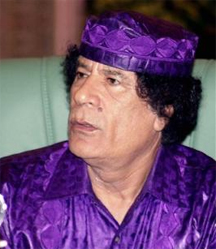PARIS/MISRATA, Libya, (Reuters) – France promised Libyan rebels yesterday it would intensify air strikes on Muammar Gaddafi’s forces and send military liaison officers to help them as fighting raged in Misrata, killing nine civilians.
Rebels said they fought Gaddafi’s forces for control of a main road in the besieged port city of 300,000, the insurgents’ last bastion in the west of the country where civil war erupted in February over demands for an end to Gaddafi’s 41-year rule.
Seven Libyan civilians, a Ukrainian doctor and a British photojournalist were killed in the course of heavy fighting between pro-government troops and insurgents in Misrata on Wednesday, medical workers said.

Around 120 people were wounded, including the wife of the Ukrainian doctor who lost both of her legs, according to Khalid Abufalgha, a doctor on the Misrata medical committee that deals with civilian casualties.
“NATO warplanes are flying over Misrata but I do not know if there are strikes,” a rebel spokesman calling himself Abdelsalam said by telephone. “NATO has been inefficient in Misrata. NATO has completely failed to change things on the ground.”
Libyan state television said later that four people were killed in a NATO air strike on “civilian and military targets” in the Bir al-Ghanam area southwest of the capital Tripoli. There were “losses in property and farmland”, it said.
Lieutenant-General Charles Bouchard, commander of NATO’s Libya operations, advised Libyan civilians to keep away from Gaddafi’s forces to help NATO carry out effective air strikes.
Hundreds of people are believed to have been killed in Misrata, where aid groups say the humanitarian situation is worsening due to a lack of food and medical supplies.
Evidence surfaced yesterday that Gaddafi’s government is dodging U.N. sanctions to import gasoline to western Libya using intermediaries who transfer the fuel between ships in Tunisia, a source with direct knowledge of the situation told Reuters.
One intermediary company, Hong Kong-based Champlink, previously unknown to the oil trading community, has sought a transaction for fuel delivery into Libya, according to a fax obtained by Reuters, and European oil traders said they had been approached by other such firms.
SARKOZY ASSURES REBEL LEADER
In Paris, French President Nicolas Sarkozy, who has spearheaded U.N.-backed NATO intervention, pledged stronger military action at his first meeting with the leader of the opposition Libyan National Council, Mustafa Abdel Jalil.
“We are indeed going to intensify the attacks and respond to this request from the national transition council,” an official in the president’s office said, quoting Sarkozy as telling Abdel Jalil: “We will help you.”
He did not say how NATO-led forces planned to overcome the stalemate on the ground after the United States and several European allies declined last week to join ground strikes.
A French military sources said Sarkozy had won approval from NATO to carry out more air strikes and France had moved six fighter jets from Corsica to the southern Greek island of Crete, closer to Libya, for that purpose.
Italy, the former colonial power in Libya that has provided air bases for the NATO mission but says its own planes will not open fire, said it may send 10 military trainers as part of increased Western efforts to help the badly pressured rebels.
U.S. President Barack Obama still opposes sending U.S. ground troops to Libya, the White House said on Wednesday, but he supports a French and British move to dispatch military advisers to help rebels fighting Gaddafi.




